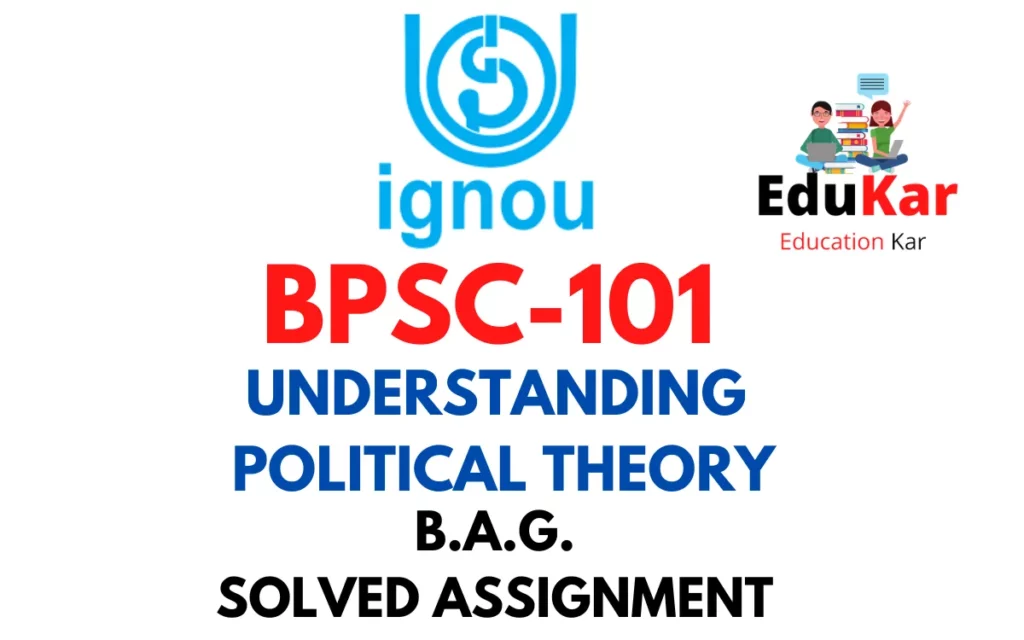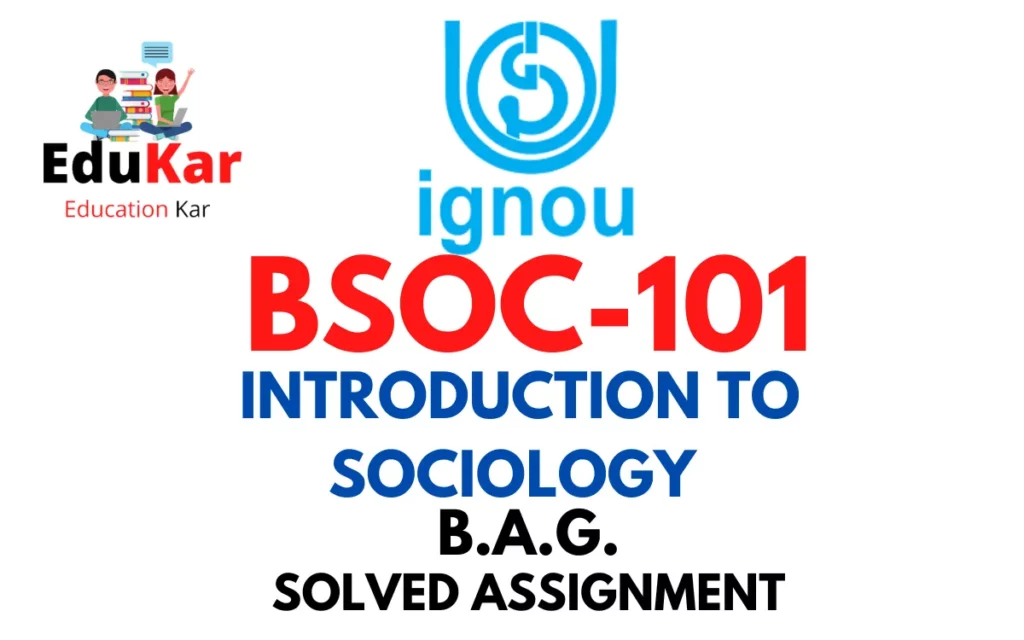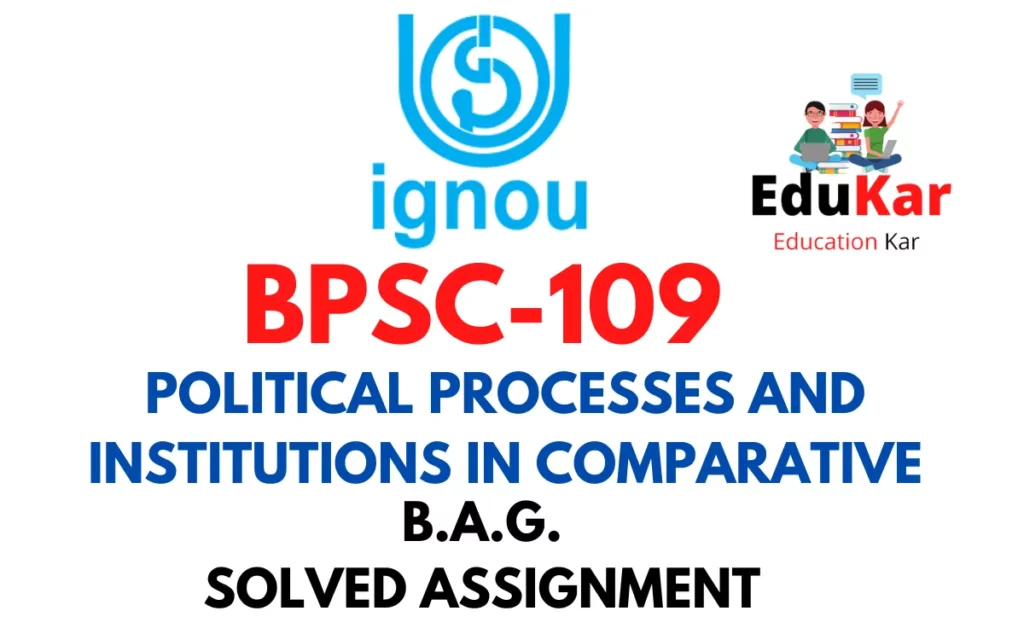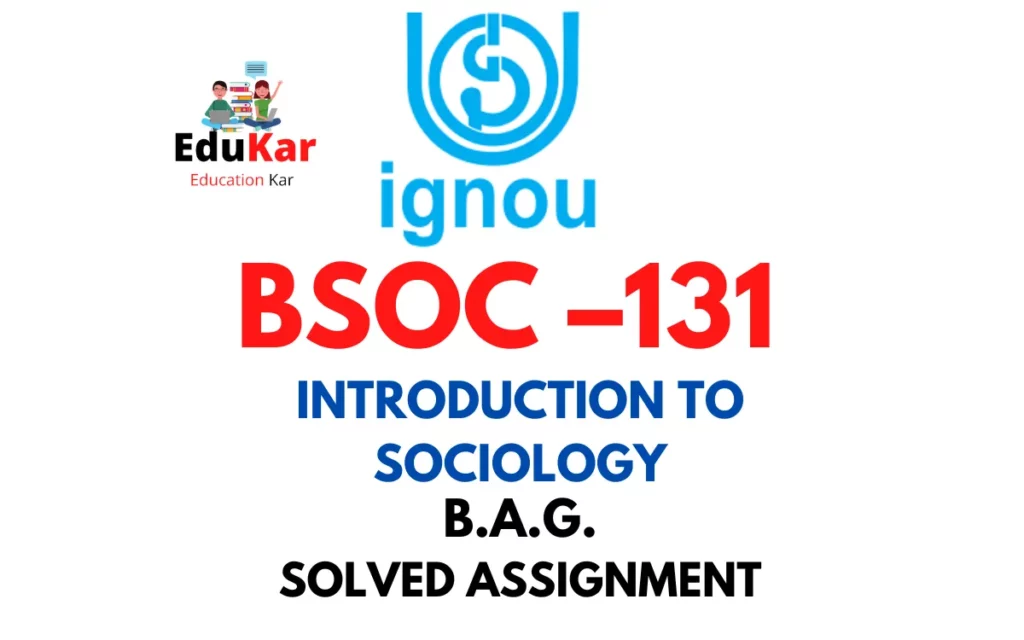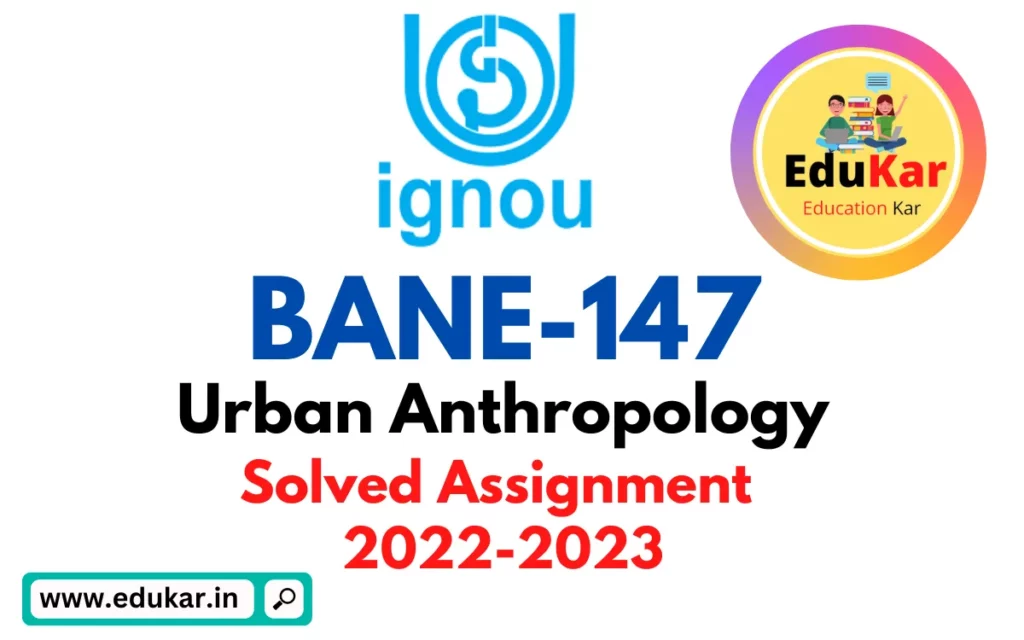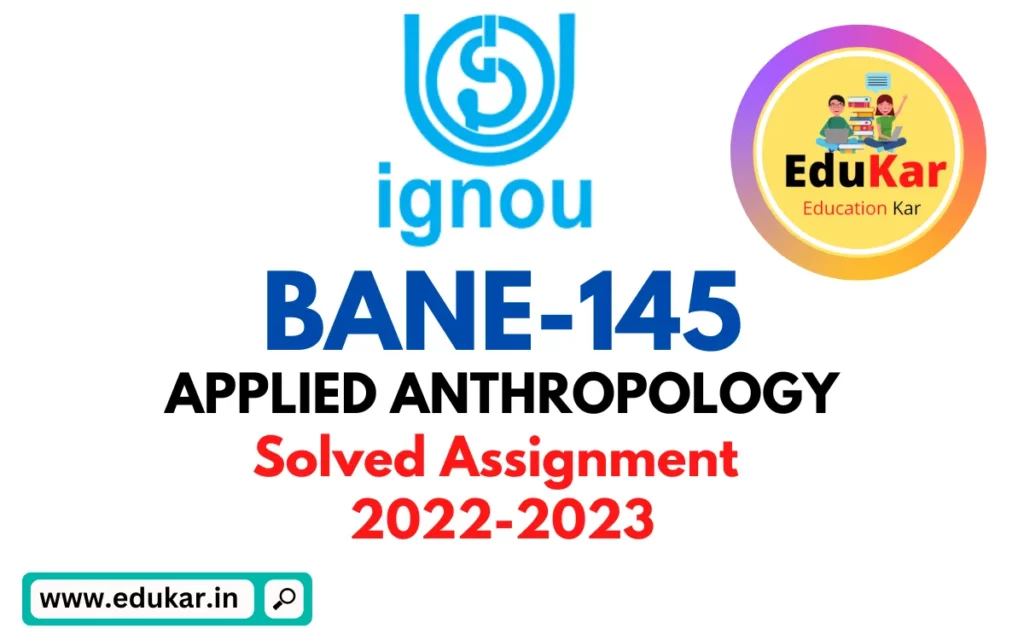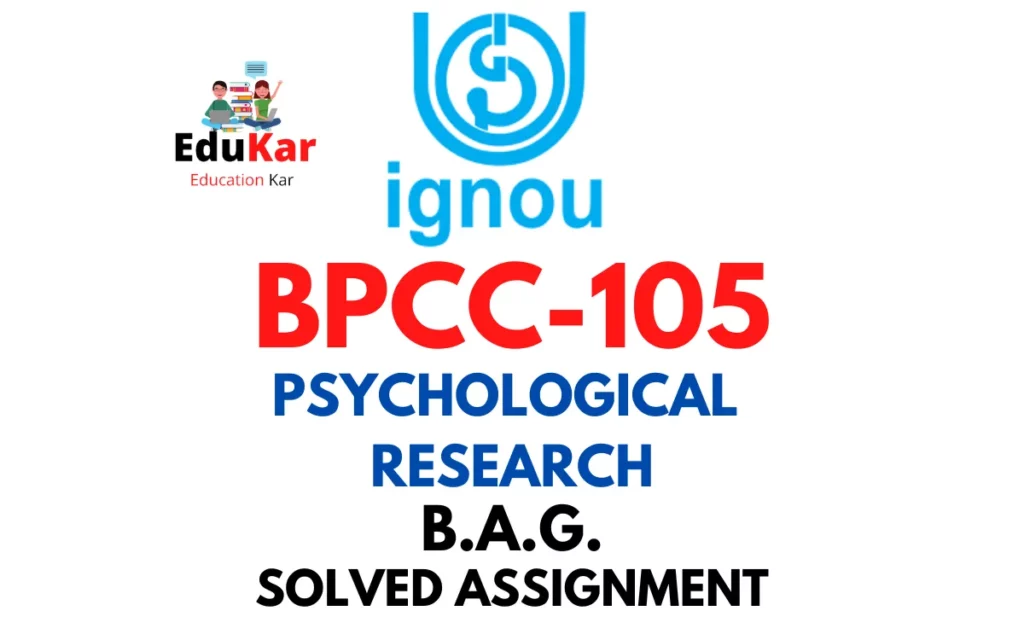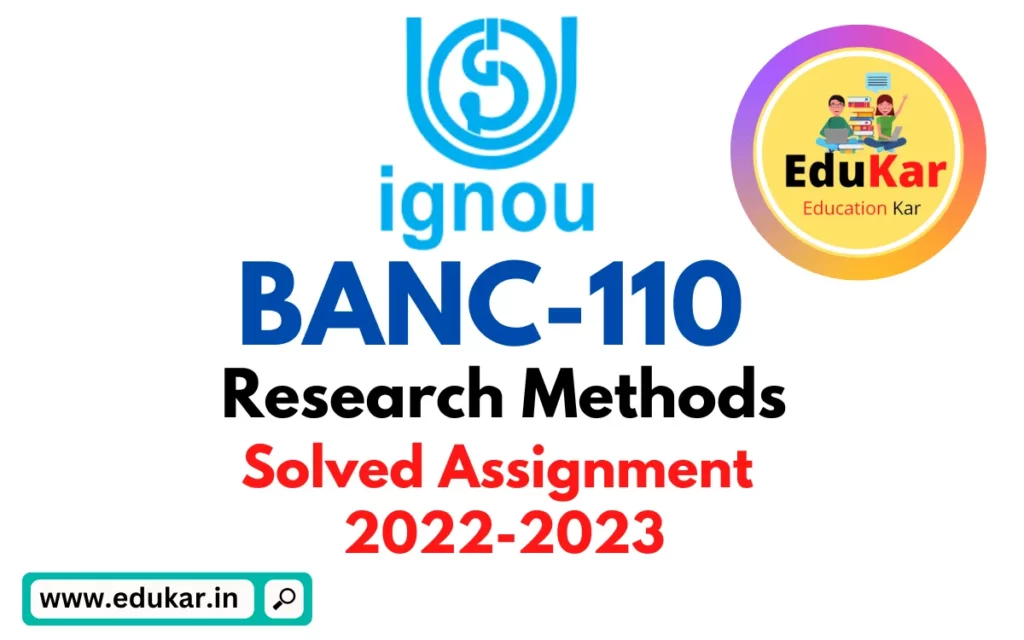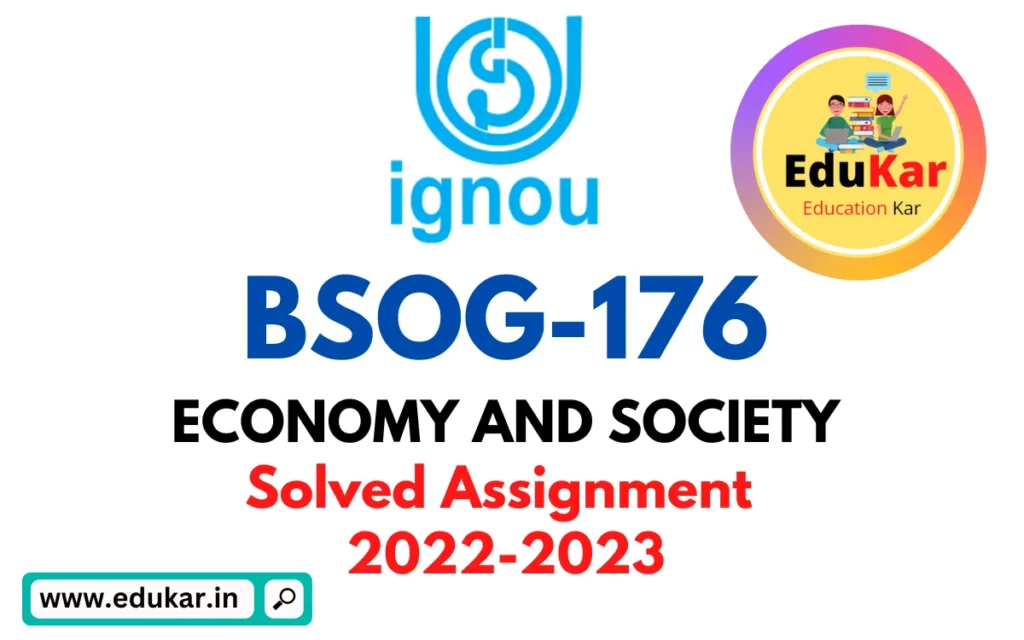Contents
- 1 Assignment A
- 2 Answer the following questions in about 500 words each.
- 3 1. Discuss the economic components of sustainable development.
- 4 2. Describe the policy innovations that can be envisaged in pursuit of sustainable development.
- 5 Assignment B
- 6 Answer the following questions in about 250 words each.
- 7 3. Highlight the important principles and features of sustainable development.
- 8 4. Write a note on the concept of global commons.
- 9 5. Describe the meaning and impact of climate change.
- 10 Assignment C
- 11 Answer the following questions in about 100 words each.
- 12 6. What is status quo approach?
- 13 7. Write a note SDG 11: Sustainable cities and Communities.
- 14 8. Briefly discuss on Earth summit 1992.
- 15 9. Explain the concept of food insecurity.
- 16 10. List out the functions of trade unions in India.
BPAG-174 Solved Assignment 2022-2023: This assignment provides an in-depth analysis of the course material for the Bachelor’s Degree in Political Science program. With precise solutions to all the questions, this guide will aid you in grasping the complexities of the subject and help you secure higher marks in your exams. Get ready to advance your understanding and achieve success with ease!
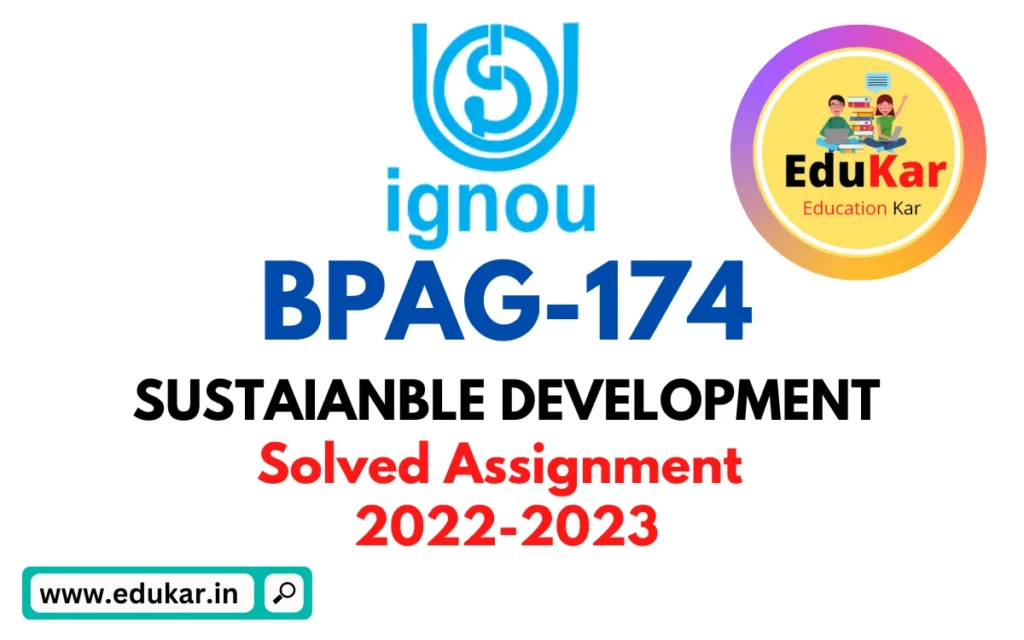
| Title | BPAG-174 |
| University | IGNOU |
| Degree | Bachelor Degree Programme |
| Course Code | BPAG-174 |
| Course Name | SUSTAIANBLE DEVELOPMENT |
| Programme Name | Bachelor of Arts (General) |
| Programme Code | BAG |
| Total Marks | 100 |
| Year | 2022-2023 |
| Language | English |
| Assignment Code | ASST /TMA / July 2022 & January 2023 |
| Last Date for Submission of Assignment: | For June Examination: 31st March For December Examination: 30th September |
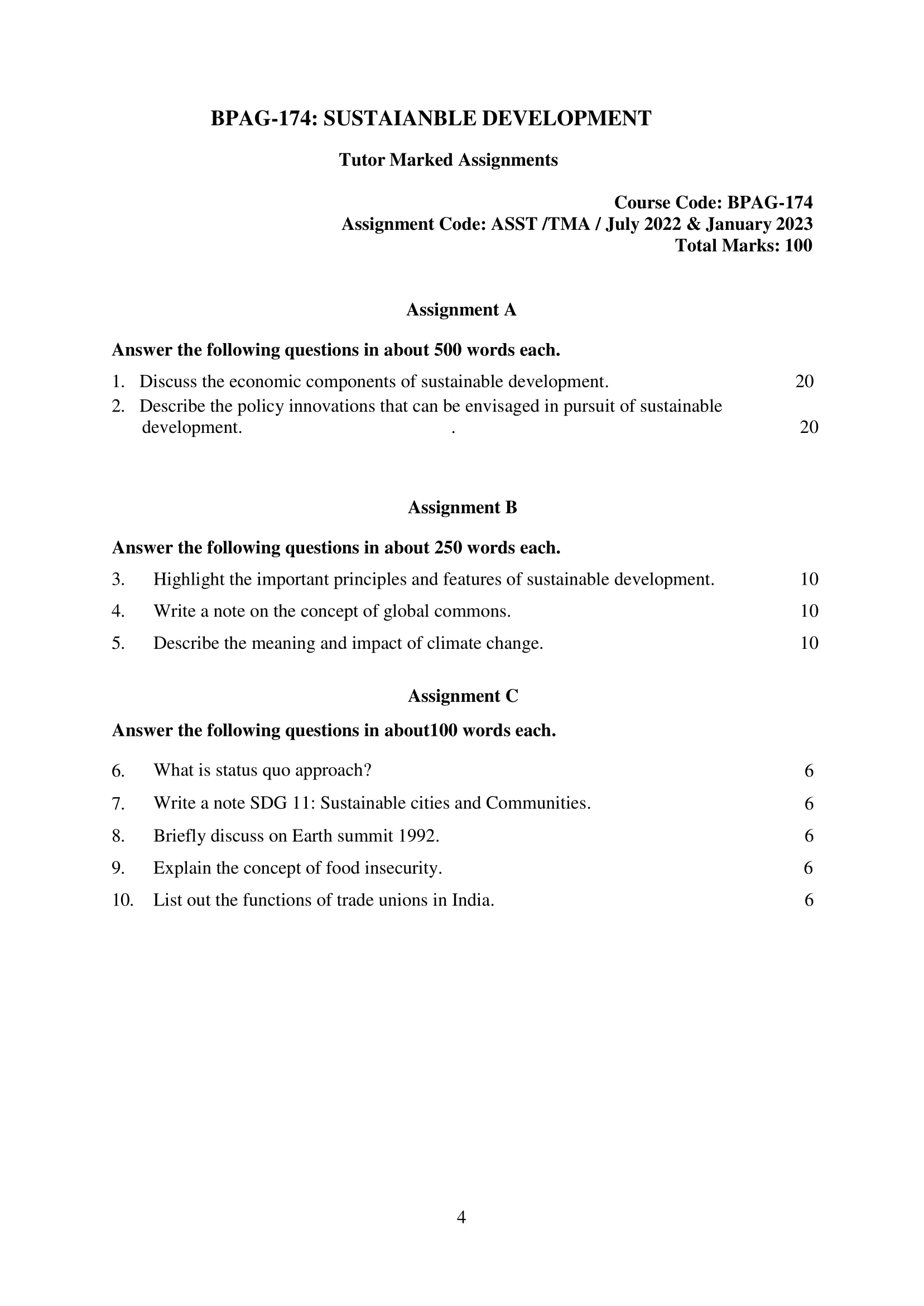
Assignment A
Answer the following questions in about 500 words each.
1. Discuss the economic components of sustainable development.
Ans: Sustainable development is an approach to economic growth that seeks to balance economic, social, and environmental objectives. It is characterized by the integration of three key economic components: economic efficiency, social equity, and environmental sustainability.
Economic efficiency refers to the efficient use of resources to produce goods and services that meet people’s needs and wants. This component is crucial in ensuring that scarce resources are allocated in the most productive way possible, maximizing economic output and reducing waste.
Social equity is concerned with ensuring that the benefits of economic growth are distributed fairly across society. This component is important because it helps to reduce poverty and inequality and promotes social justice. To achieve social equity, governments must implement policies that ensure equal access to education, healthcare, and job opportunities, as well as protect workers’ rights and support small businesses.
Environmental sustainability focuses on preserving the natural resources and ecosystems that support life on earth. This component is essential for ensuring that future generations will have access to the resources they need to thrive. To achieve environmental sustainability, governments must implement policies that regulate the use of natural resources, reduce pollution and waste, and promote the development of renewable energy sources.
In conclusion, sustainable development requires a holistic approach that balances economic efficiency, social equity, and environmental sustainability. To achieve sustainable development, governments must implement policies that promote economic growth while ensuring that the benefits of growth are shared equitably across society and that the environment is protected for future generations.
2. Describe the policy innovations that can be envisaged in pursuit of sustainable development.
Ans: Policies play a crucial role in promoting sustainable development by guiding and regulating actions and behaviors of individuals, organizations, and governments. The following are some policy innovations that can contribute to sustainable development:
- Green taxes and subsidies: Green taxes on resource-intensive and polluting activities can provide incentives for businesses to adopt cleaner production processes, while subsidies can help promote the development of cleaner technologies.
- Renewable energy targets: Governments can set targets for the use of renewable energy sources, such as wind and solar power, to reduce dependency on fossil fuels.
- Eco-labeling schemes: These schemes provide consumers with information on the environmental impact of products and services, encouraging businesses to adopt sustainable production practices.
- Sustainable procurement policies: Governments can require public sector organizations to purchase products and services that are environmentally friendly and sustainably produced.
- Cap-and-trade systems: These systems limit the amount of greenhouse gas emissions that businesses can emit, providing an incentive for companies to reduce emissions and invest in cleaner technologies.
- Energy efficiency standards: Governments can set minimum standards for energy efficiency in buildings, appliances, and vehicles, reducing energy consumption and reducing greenhouse gas emissions.
- Sustainable land-use policies: Governments can regulate land use to preserve natural habitats, reduce deforestation, and prevent soil degradation.
- Sustainable transportation policies: Governments can promote sustainable transportation options, such as public transportation and bike lanes, reducing dependency on cars and reducing air pollution.
- Biodiversity protection policies: Governments can protect and conserve biodiversity through protected areas, species-specific conservation plans, and restrictions on activities that harm biodiversity.
- Sustainable agriculture policies: Governments can promote sustainable agriculture practices, such as reduced pesticide use and water conservation, through training, research, and financial support.
Assignment B
Answer the following questions in about 250 words each.
3. Highlight the important principles and features of sustainable development.
Ans: Sustainable development refers to development that meets the needs of the present without compromising the ability of future generations to meet their own needs. Key principles of sustainable development include intergenerational equity, the protection of the earth’s natural resources, and economic and social sustainability.
- Intergenerational equity: This principle recognizes the importance of considering the impact of current actions on future generations. It requires that the benefits and costs of development be distributed fairly across generations.
- Resource protection: The earth’s natural resources, including its land, water, and biodiversity, must be protected and used in a sustainable manner. This includes efforts to conserve, restore, and manage these resources for future generations.
- Economic sustainability: This principle recognizes the importance of balancing economic growth with environmental protection and social equity. A sustainable economy should ensure that economic growth is driven by efficient use of resources and not by depletion of the environment.
- Social sustainability: This principle recognizes the importance of ensuring that the benefits of development are distributed equitably and that all people have access to basic needs such as food, water, housing, and healthcare. It also includes efforts to address social issues such as poverty, inequality, and human rights abuses.
- Integration of economic, social and environmental objectives: Sustainable development requires a holistic approach that integrates economic, social, and environmental objectives. This requires coordination and cooperation across multiple sectors and stakeholders to achieve a common goal of sustainable development.
- Transparency and participation: Sustainable development requires open and transparent processes that involve all stakeholders in decision-making. This includes involving communities, businesses, and governments in shaping the future of their communities and the planet.
4. Write a note on the concept of global commons.
Ans: The concept of global commons refers to resources, such as the atmosphere, oceans, and outer space, that are shared by all nations and are essential to the well-being and survival of humanity. These resources are considered common property and are not owned by any individual nation, but are managed and governed by international agreements and institutions. The global commons are essential to the functioning of the Earth’s biosphere, and they provide vital services such as climate regulation, food production, and the dissemination of information and culture.
One of the biggest challenges in managing the global commons is the difficulty in finding a balance between preserving these resources for future generations and using them to meet the immediate needs of people around the world. For example, the use of fossil fuels has resulted in the buildup of greenhouse gases in the atmosphere, which is causing global climate change and threatening the stability of the Earth’s ecosystems. At the same time, millions of people around the world depend on fossil fuels for their energy and transportation needs.
Another challenge is ensuring that the global commons are managed in an equitable and sustainable manner. Some nations have a greater capacity to use and exploit these resources than others, and it is important to ensure that the benefits and costs of their use are shared fairly among all nations. This requires effective international cooperation and a commitment to preserving the global commons for future generations.
5. Describe the meaning and impact of climate change.
Ans: Climate change refers to long-term shifts in average global temperature and weather patterns, largely driven by human activities such as burning fossil fuels and deforestation. The impact of climate change is wide-ranging and affects many aspects of our lives. Rising global temperatures have led to melting of polar ice caps, causing sea levels to rise and leading to more frequent and severe natural disasters such as hurricanes, floods, and droughts. The changing climate also affects agriculture, altering growing seasons and leading to food shortages in some areas. Climate change also has negative impacts on biodiversity, causing species to migrate or become extinct as their habitats change. The impacts of climate change are not limited to the natural world; they also have significant social and economic consequences. For example, people living in coastal communities may have to relocate due to rising sea levels, while others may experience economic hardship due to declining crop yields. Climate change is a global problem that requires collective action to address. This means reducing greenhouse gas emissions, transitioning to renewable energy, and investing in resilience and adaptation measures to help communities cope with the impacts of a changing climate.
Assignment C
Answer the following questions in about 100 words each.
6. What is status quo approach?
Ans: Status quo approach is a mentality or approach that favors maintaining the existing state of affairs and resists change. This approach is often characterized by a reluctance to take risks or embrace new ideas and instead seeks to preserve the status quo. The status quo approach is sometimes seen as a conservative or traditional mindset, and is often at odds with more progressive or innovative approaches. Despite its tendency to resist change, the status quo approach can provide stability and security in certain circumstances, and may be appropriate in some situations where change is not necessary or may cause more harm than good.
7. Write a note SDG 11: Sustainable cities and Communities.
Ans: SDG 11, also known as the Sustainable Cities and Communities goal, is one of the 17 United Nations Sustainable Development Goals. This goal aims to make cities and human settlements inclusive, safe, resilient, and sustainable. SDG 11 focuses on reducing the environmental impact of urbanization and promoting sustainable urban development. This includes improving access to basic services, housing, and transportation for all, reducing the risk of disasters, and conserving and restoring urban ecosystems. SDG 11 also promotes the integration of sustainable urban development into national and local policies and encourages partnerships between local authorities, communities, and other stakeholders. Achieving SDG 11 is crucial for ensuring the health and well-being of current and future generations, as well as for creating a more sustainable future for all.
8. Briefly discuss on Earth summit 1992.
Ans: The Earth Summit, also known as the United Nations Conference on Environment and Development (UNCED), was held in Rio de Janeiro, Brazil in 1992. It was one of the largest and most comprehensive global environmental conferences in history, attended by over 178 nations. The Earth Summit resulted in the creation of Agenda 21, a comprehensive and far-reaching plan for sustainable development, as well as the adoption of two international treaties: the Convention on Biological Diversity and the Framework Convention on Climate Change. The Earth Summit marked a turning point in the international community’s recognition of the interdependence of environmental and economic issues and paved the way for future global environmental initiatives. The Earth Summit remains a seminal event in the history of environmental conservation and sustainable development efforts.
9. Explain the concept of food insecurity.
Ans: Food insecurity refers to a lack of access to enough nutritious food to meet an individual’s or a household’s needs. This can occur due to a combination of factors, including poverty, unemployment, low income, lack of access to healthy food, and natural disasters. Food insecurity can have serious health consequences, including malnutrition and hunger, and can also lead to reduced cognitive ability and decreased work productivity. The concept of food insecurity is often used to describe the situation in developing countries, but it is also a growing issue in developed countries as well. To address food insecurity, governments and organizations must work to improve food distribution systems, create economic opportunities, and provide education and resources to promote healthy diets. Addressing food insecurity is crucial for achieving sustainable development and reducing poverty and inequality.
10. List out the functions of trade unions in India.
Ans: Trade unions in India serve several important functions for workers. These include:
- Representation: Trade unions act as a representative body for workers and provide a voice for their concerns and grievances.
- Collective bargaining: Trade unions negotiate on behalf of workers with employers to secure better wages, benefits, and working conditions.
- Legal assistance: Trade unions provide legal assistance and representation to workers in disputes with employers.
- Job security: Trade unions advocate for job security and the rights of workers, including protection against unfair dismissal and discrimination.
- Education and training: Trade unions offer educational and training programs to help workers improve their skills and job prospects.
- Social welfare: Trade unions provide support for workers and their families, including medical and pension benefits.
Overall, trade unions play a vital role in promoting the rights and interests of workers in India, and in ensuring that they are treated fairly and with dignity in the workplace.
How to Download BPAG-174 Solved Assignment?
You can download it from the www.edukar.in, they have a big database for all the IGNOU solved assignments.
Is the BPAG-174 Solved Assignment Free?
Yes this is absolutely free to download the solved assignment from www.edukar.in
What is the last submission date for BPAG-174 Assignment?
For June Examination: 31st March, For December Examination: 30th September

